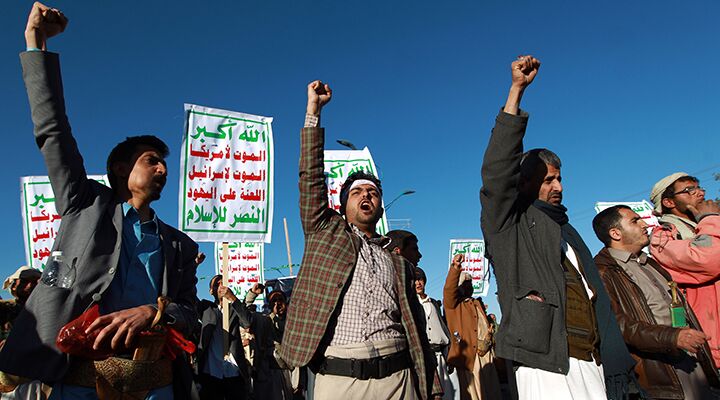
Yemen: Divided
Divide and conquer. No statement better sums up the small country of Yemen occupying the southwest corner at the base of the Arabian Peninsula. The nation is divided, and all that remains is the conquering. Judging by the current rate of events, that will happen soon.
It was only in September that United States President Barack Obama announced Yemen was a success in the fight against terrorism. Within weeks, Houthi rebels blasted their way into the capital, Sanaa. From there, Houthis seized control of almost the entire region of north Yemen.
The Houthis quickly established a power-sharing agreement with the Yemeni government, though that did little to curb the fighting. A three-way power struggle emerged between the Houthis, the U.S.-backed government and al Qaeda in the Arabian Peninsula (aqap). Attacks occur daily as each side vies for a larger chunk of the Yemen.
On January 22, the fight narrowed to two hungry contestants. Yemen’s president, prime minister and the entire cabinet—all backed and supported by America—resigned. On January 20, Houthi rebels launched an attack and captured the presidential palace. Shots were also fired at the prime minister’s home. The royal guard was defeated and the state-run media turned over to the Houthis. According to cnn, two U.S. warships were in position on the Red Sea in case the U.S. embassy needed to be evacuated.
The Houthis alleged that the impetus behind the attack was the Yemeni government’s decision to act contrary to the power-sharing agreement signed when Houthi rebels seized the capital. More likely, the Shiite Houthi group saw its opportunity and made a power grab. The government, weakened from fighting two different terrorist groups, presides over one of the poorest nations in the Middle East. After months of tit-for-tat fights, Houthi rebels took the initiative.
Yemeni President Abdrabuh Mansour Hadi became a prisoner in his own home after Houthis surrounded the complex. From his home, the president listened to the rebels’ demands, centered on giving more political representation to the Houthis, as well as giving them the ability to amend the Constitution—which they disagree with. In return, the Houthis promised to vacate the palace and release the president’s chief of staff, who had been captured before the attack began. Facing impossible demands, the government resigned.
The two real powers in the country are now the terrorists. aqap is the dominant power in south Yemen, whereas Shiite Houthi controls the north. Now that the government has collapsed, the only question is who will come out on top.
This branch of al Qaeda has shown its resolute nature over the years. It has outlasted U.S. drone strikes and, now, the country’s government. However, aside from skirmishes with Yemeni forces and the occasional battle with Saudi forces, aqap has faced little resistance on the ground. Now that dominance has been challenged by the Houthi rebels.
The Houthis represent a real threat to al Qaeda. During the Houthi attack on the government, the offices of the presidential guard were taken. This rapidly expanded the terrorist group’s arsenal with tanks and artillery. The arms will come in handy if the Houthis take the fight to aqap.
There remains one key factor on the Houthis’ side.
Being Shiite, the Houthis are close friends with the major Shiite powerhouse in the region: Iran. The Houthis are, for all intents and purposes, an extension of Iran’s influence.
In an opinion piece for the Providence Journal, Charles Krauthammer wrote:
The Houthi have local religious grievances, being Shiites in a majority Sunni land. But they are also agents of Shiite Iran, which arms, trains and advises them. Their slogan—“God is great. Death to America. Death to Israel”—could have been written in Persian.
In a weakened, divided and poor state such as Yemen, any group that has such a powerful backer could quickly fill the position as regional power.
The Houthis probably didn’t have much to fear from America either. Days after the president resigned, a U.S. drone strike took out a number of aqap terrorists. The U.S. then confirmed it was planning on continuing its fight against al Qaeda—subsequently aiding the rise of the Iranian-backed Houthi.
With Yemen divided, the fight has begun between the Sunnis and Shiites. Watch Iran. The Persians already have the upper hand following the collapse of the government. All that remains is the conquering.
